The interviewee, who used to engage in web activism from France, returned to Turkey to be part of the events there, documenting police violence, government propaganda, and great game-changing solidarity among the diverse groups of the Turkish society eager to reclaim democracy from its high-handed rulers.
– Thanks for agreeing to update us from Istanbul. How did the events develop? What is the situation on the ground right now?
– In the very end of May, 200-300 people staged a sit-in in Gezi Park, located in Taksim Square, to protest the government’s plan to transform the park into a multi-functional building. At dawn on the 31st, the police unleashed extreme force on these people: showering them with water and gas, and burning their tents. Thousands, discontent with the authoritarian tendencies of the current government, rose up in support of the Gezi Park protestors.
Over past two weeks, we created a kind of utopia land in the heart of the city, protected from the police by the barriers that protestors built themselves, where everybody contributes to a communal life in any way they can, and any need (food, drinks, medicine, pads) is for free, especially after the injuries from the police. There are also two libraries, camping sites, open-air cinemas, concert areas, theatre shows, memorial areas for the friends we lost, where all previous pains of our society is acknowledged and remembered. When Islamists (in Turkey’s political scale – rightists, ed.) pray 5 times a day, leftists protect them from any police attack or other disturbances.
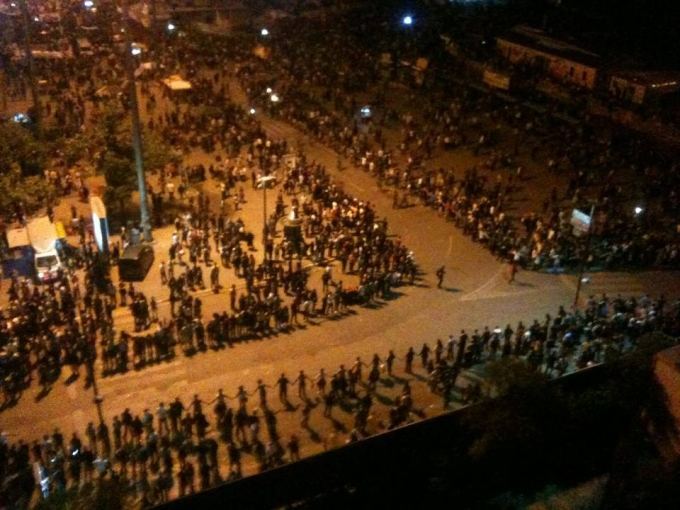 |
| Dominyko Milašiaus nuotr./Turkey |
– What is the governmental response?
– Government’s response is inconsistent and constantly changing. At first they wanted the Park clean from us and thus employed all measures, including provocation and negative public relations campaign. It started our very aggressively; labeling us as “terrorists” or radicals – or, according to the Prime Minister, marginal groups. (PM Recep Tayyip) Erdogan even coined a term for us – “capulcu’s” (cha-poul-djou) – a devalorizing term implying that one is from a sort of low culture. He said we were “religion-less people who entered mosques with shoes on and with alcohol” and announcing the resistance as an “illegal protest.” They keep blaming us for the vandalism, which we aren't responsible for, as there's auto-control within the protestors to clean the streets after every protest and protect the movement from any provocations.
In the past few days violence escalated in other cities but as the international media is focused on Istanbul, the police backed out of Gezi and Taksim. Our mayor kept tweeting love messages to the protestors. This morning, the mayor announced "from now on your security is the responsibility of your police brothers. Trust them, don't worry, there will absolutely not be any intervention in Taksim or Gezi." People trusted him, they went to the park, bringing their kids and animals along. Early morning, police arrived in the square "to take off the political party flags" that were hung on one of the controversial buildings in the square – a cultural symbol, which the government wants to demolish too. As soon as they came, they started watering and gassing again. Then we saw people holding leftist party flags, throwing Molotov cocktails at the police. Those parties are so small, we don't even know about them, so there is high possibility these provokers are police-insiders. These provokers were burning down police cars and stuff, while the original protestors were holding hands and creating human shields to protect the police. The police, no surprise, attacked the protestors and not the cocktail-throwing people. This theater went on all day and all night: they targeted a handicapped man, beat up a 13-year-old until he passed out. At the same time, another group of police unit went into Caglayan Palace of Justice and took over 70 lawyers who were taking care of the protestors into custody. They were beating them up as they picked them. Along with the images of mistreatment of lawyers, pictures of the Molotov people were shared in the media. The police were very kind to these provokers with the Molotov Cocktails, even though these people had transceivers in their pockets, and guns, while lawyers were psychologically pressured to give away their IDs in order to be freed.
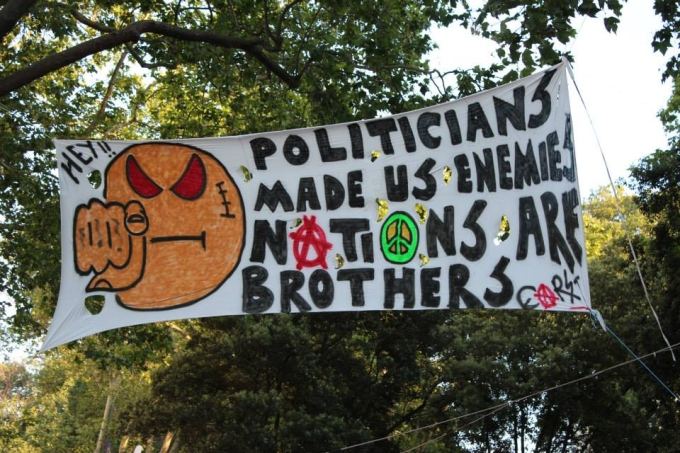 |
| Dominyko Milašiaus nuotr./Turkey |
Tomorrow Erdogan is meeting with some representatives from the protestors and some artists – we don't know who they are or how they were picked, they aren't the people we want Erdogan to meet, as they were never in the protests. People joke that it would be as if protests were to break out into Central Park and Obama would meet Kim Kardashian.
– Did police attack you?
– I was ambushed twice, and generally always exposed to gas and water. The first ambush was in one of the roads to Taksim on the 2nd of June, around 1 at night. The police and the Carsi (char-shi) – a highly organized football supporter group of Besiktas, that are sending out social messages through their sports activities, and are the organizational, motivational and stress-relieving basis for the movement, made an unofficial agreement that they wouldn't attack us.
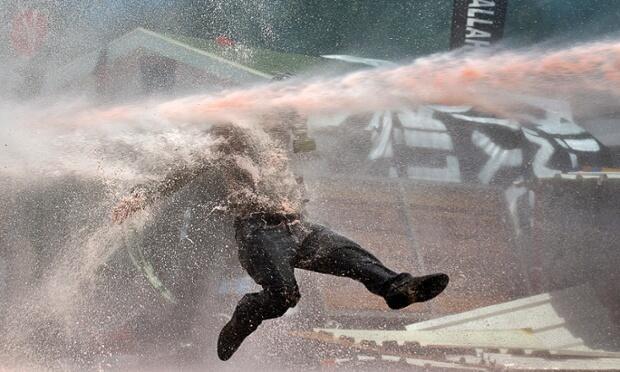 |
| Dominyko Milašiaus nuotr./Turkey |
But on the way, a huge group of civilian AKP supporters with bats, sticks and knives approached us. Police started coming towards us from the behind and so we were stuck in the middle. Police were gassing and watering (with the orange acid gas – blinds and burns flesh and throat) and the AKS supporters were beating up everybody they could find. It was literally a manhunt and we were running. Luckily, the buildings and the shops around let everybody in. I entered a random building because old lady let me and my friends in. A civil-dressed police officer entered as if he was one of us and just as we entered he shouted out "HERE!". Some people tried to kick him out of the building and close the door, but the police threw in 3 gas bombs inside the building and shut the door from the outside. Outside was full of gas so we had to run to the roof for air to breathe. From there, I watched 4 policemen and 14 civilians attack one girl of my age. I could do nothing else but write all around Twitter for others not to come.
During the second ambush, they surrounded us and kept shooting smoke and gas grenades. Me and my friend were running uphill. Half way up I turned around and I saw that the police had grabbed her by the arm, dragging her to a sidewalk to the bushes. People were stepping on her, they were beating her up like crazy. I couldn't go back to help so I yelled at the Carsi people in front of me and they went to get her. As I was watching all this, a policeman grabbed me by the arm, pushed me to the ground and hit me with his metal stick two or three times. Another Carsi person shielded himself over me, while the police kept beating him. I don't know how I ran up but I entered Ritz Carlton hotel along with many others. Next to it was another skyscraper, hundreds of people entered there. The police surrounded both: the plaza asked everyone to leave, handing them to the policemen, but Ritz protected us, gave us a place to stay and food until they went away.
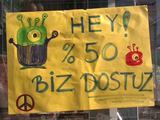 |
| Dominyko Milašiaus nuotr./Turkey |
Overnight, we became nurses, chemists, pharmacists, journalists, intelligence agents - we were being sprayed with a sort of gas that was orange, that burnt your flesh even if the gas was there a while before you arrived. It feels like if a hundred needles are sticking on your throat and you're blinded for a minute. If you try to wash it off with water or milk, it gets ten times worse, so we learnt that the only way to ease the burning feeling is to mix Talcid or Rennie with milk and spray it on your open areas. Then you go home and wash yourself with baby shampoo.
– What are your political demands? Is it really about the park?
– This movement is not a political one; it's about the struggle to live freely and respectably. That's precisely why the Park has become such a utopia where people help each other out. Everything we do is based on our feelings of how we can improve and protect one another. Our calculations don't have any other interest or basis or source. Participants are now united by a need for justice. We are not on the streets for our political party, but to tell the AKP that they have failed in ensuring functioning democracy.
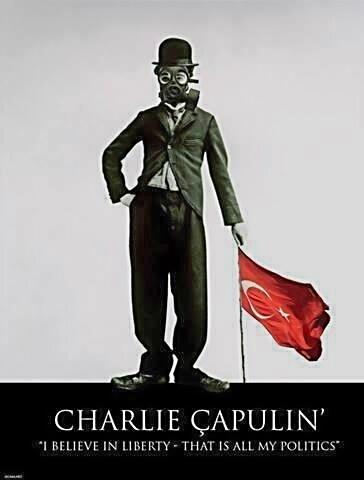 |
Our only demand is for a government that does not interfere in or manipulate our civil rights. We want uncensored media. We want the higher commanders responsible for the recent use of force to step down. We don’t want power concentrated in the hands of Erdogan; we want an independent legislative and judiciary.
The political discourse in Turkey today is absurd – we hear judges re-investigating their decisions or ministers taking actions with the usage of new terminology: “by the order of Mr. Erdogan.” And this is a person who once said that “democracy can never be the ends but only a tool”. This just proves the lack of accountability and disappearance of the checks and balances mechanism. We want the Prime Minister to listen to us, instead of threatening to gather 1 million people on the street against us, and that he's barely holding back the 50% of the population. Democracy is about multiple voices being heard, not just during the elections.
He kept on trying to associate us with different parties, when one didn’t work, he and his media moved on to the next. First he said CHP (Republican party) organized this. Then their media said you’re worse than PKK – Kurdish Workers Party. Then they went on to marginalized groups that terrorized the country and ashamed it in the eyes of the international arena.
– What inspired you to join the protests?
– I am a responsible and responsive human being, striving to live freely and brotherly in my own country. Such has been the message of the protestors since day one, and I could identify with it. And so could many people from all ethnicities (Turks or Kurds), religions (Christians or Muslims), ideologies, because we are resisting, not fighting – we never attack the police, we have a wonderful time at the Park – dancing, singing, reading, resting, discussing.
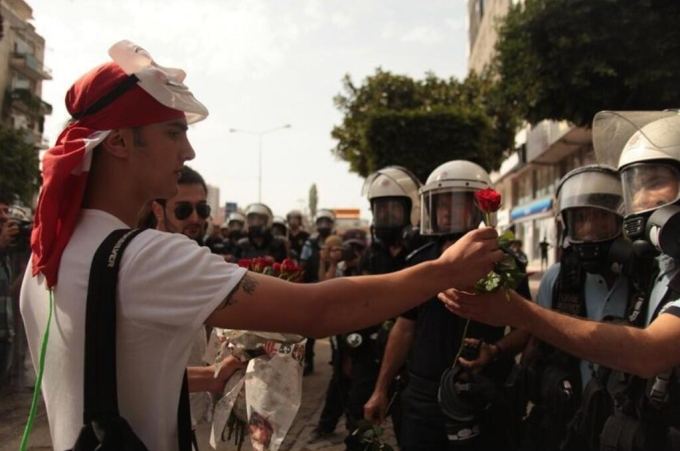 |
| Dominyko Milašiaus nuotr./Protestors giving policemen flowers |
Everybody should know that we are kids, and we are good kids. We even clean the streets that witness the way the police hunt us down every morning. This movement is a breakaway for a society that has been heavily divided for so long through identity politics. We saw football supporters from rival teams joining together – never happens in Turkey! We saw a Galatasaray fan telling an injured Fenerbahce fan to stay strong, saying “you have plenty of games to watch where you'll beat us!” We heard a Kemalist uncle who yelled “We are the soldiers of Mustafa Kemal!” say, “have we been hearing about the Kurds from this same media for all this time?!?!”. This is revolutionary for Turkey – a re-discovery of the Anatolian spirit once lost to political games.
– Even before coming back to Turkey, you were participating in web-activism from France. Overall, what do you think is your main contribution to the movement?
– I don't feel comfortable talking about “my” contribution to the movement, I'm supporting my friends in any way I can. For all the time I was in Turkey, I was at the Park. When I was away, I wrote articles, I contacted international newspapers and TV channels. I translated some texts. I also tried to help the chain of information regarding the secure locations and urgent needs during the first nights where police violence was at its peak. Again, I wasn't the only person doing any of these. Whatever contribution took place, it took place as the product of the totality of all our efforts.
– What do you think is the broad meaning of web-activism?
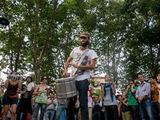 |
| Dominyko Milašiaus nuotr./Turkey |
– I shamefully admit that I didn't believe in web-activism before getting involved in it myself, although I was and still am a close follower of the Arab Spring. We had a banner in Gezi saying “Resist Telephone Charger!” It's humorous, but it's true. There's a reason why all the Arab Spring dictators, (and ironically Tayyip Erdogan too) called Twitter a 'troublemaker.' It's unstoppable, #direngezi (resist Gezi) was world Trending Topic number one for days, and it is still in the top 3.
It's the biggest weapon civil society has to make themselves heard both within their own society and on the international scale. When our media failed to report what we were doing, we used social media to make sure the world knew. We used social media to communicate locations, needs, losses, etc with one another. 3 days ago, 34 students, among them my friend, got taken into custody for being “too active on Twitter with regards to Taksim”: having tweets about the locations of the police, first aid areas, numbers for doctors, lawyers, nurses. This shows how much of an impact web-activism can have.
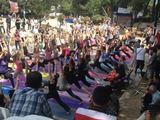 |
| Dominyko Milašiaus nuotr./Turkey |
– What are the most successful techniques of civil disobedience?
– Humor and pacifism. Pacifism, because if you are peaceful in the way you express yourself and continue your struggle, people feel your sincerity. This is what we see in Taksim every day, for the support from groups that were initially against us increases every day. Humor, because humor is the use of disproportional intelligence in the face of disproportional force. It relaxes everyone and it expresses much in a little phrase. It's relatable and it shows the protestors' confidence in what they are doing. It shows that they aren't the raging terrorists they are shown to be.
– How widespread are the protests today?
– Very, yet not enough. Turkey’s West coast, which is said to be more secular and Europeanized, is really active with protests in Istanbul, Ankara, Izmir, but surprisingly the uprisings have also spread into inner Anatolia and all around Turkey. That is still despite the lack of coverage by mainstream media and tormenting the image of the Gezi Park protestors by pro-government sources, portraying them as terrorists or thugs, and labeling them as “immoral atheists”, thus leaving rural Turkish population either unaware or misinformed about what's going on. Jokingly saying, a Westerner today possibly knows more about Gezi than someone from Eastern Turkey. That is why our Twitter and Facebook campaigns to encourage citizen journalism and spread photos of police behavior are extremely important to balance the regime’s narrative.
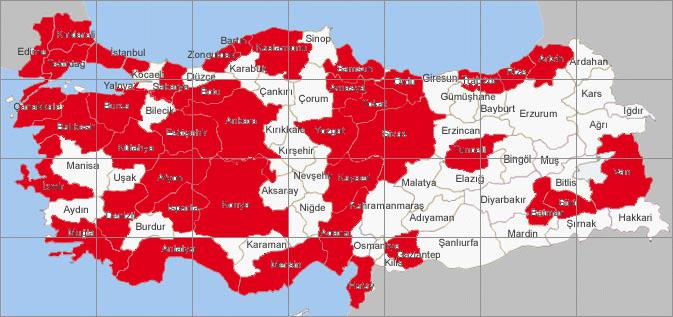 |
| Protests in Turkey |
– Who is most likely to support the protesters?
– There are people from all age groups supporting the protests in their ways but the most active would be 15-35, which is normal for that is the dominant age group when you look into our population. But parents of these youngsters are there as well; mothers bring food, grandmothers open their houses to people who get affected by gas.
Supporters even developed their own symbolism – if a person is willing to host a protester, he would put a white towel on his window to let the protesters know. Certain schools, hotels (like Ritz), restaurants, cafes, shops and pharmacies stayed open 24 hours for days, letting all who sought refuge in, not letting the police take them out, providing them with food, shelter, water, a place to stay, medicine, first aid – anything. Volunteer doctors, nurses and lawyers never went home. All these people are the silent heroes of this movement. These businesses were targeted in the speeches of Erdogan (“all supporters will pay for the consequences”), as well as the banks that gave shelter to the protestors – Erdogan encouraged his supporters to “take out your money from those banks, show them your power.”
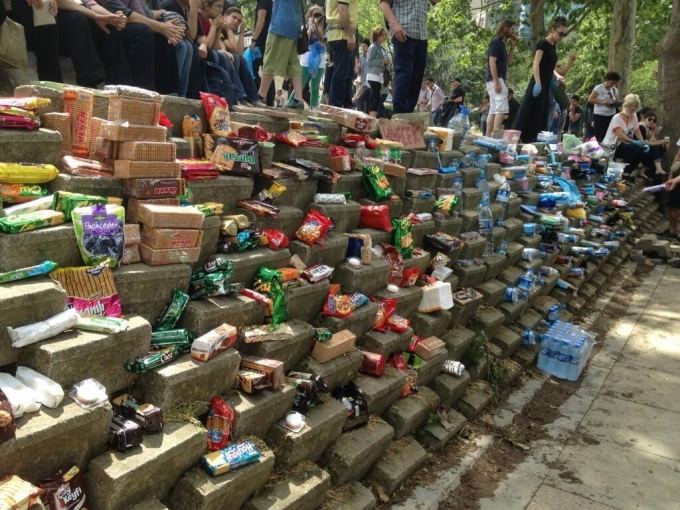 |
| Dominyko Milašiaus nuotr./First market in Gezi, everything is free |
Pharmacies were giving out things we would need for protests for free, I once went to pick up as many gas masks and talcids as possible. I took like 50 of each. I wanted to pay, the man said "don't be ridiculous. Seriously, don't." And gave me like 20 more to hand out to as many people as possible. when I needed a cream at the Ritz night to help my injury, the same pharmacy was open at 4:30 am, as were all the others in the area.
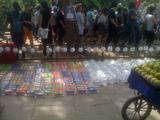 |
| Dominyko Milašiaus nuotr./Turkey |
Even one Imam opened the doors of his mosque to all the injured so that they could get first aid. The police broke the mosque's window and gassed it, along with all other first aid areas. Later on, this was the mosque where protestors were claimed to have drunk alcohol. The Imam went on public TV and announced that this was not true, and that lives of people were saved there under his permission. The following day, he was suspended from his duty by the government.
– Could this movement be called an offshoot of the Arab Spring?
– No, for several reasons. First of all, regardless of how authoritarian and arbitrary the government may have become, the regime in Turkey is clearly different than in any Arab Spring country in that we aren’t talking about a decades-long dictatorship here. We have a democracy and we have a democratically elected government; we aren’t happy with the way it’s using democracy and intervening in our rights.
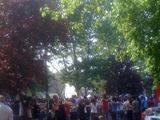 |
| Dominyko Milašiaus nuotr./Turkey |
Also, one reason I find Turkey particularly hard to deal with is because of the tense inner dynamics of it's extremely diverse society. The causes, the symptoms and the hoped outcomes of this movement are different. It is similar to Tahrir in some ways, more similar to the current turmoil Egypt is moving into with the upcoming protests of June 30th, but it's definitely not an “offshoot”. People didn't look at the Arab States and gained consciousness. This is a spontaneous reaction of the people to a government that doesn't accept anyone who disagrees with their values and agenda as their People, and seeks ways to marginalize them, and legitimizes its arbitrary decisions through the share of votes they earned in the previous elections. That simply isn’t how democracies work. If we had to find a historic analogy, it would more likely be the year 1968 in Paris. But even that would not fit for what’s going on in Gezi.












